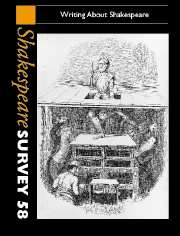Book contents
- Frontmatter
- Having Our Will: Imagination in Recent Shakespeare Biographies
- Toward a New Biography of Shakespeare
- Jonson, Shakespeare and the Exorcists
- ‘Lending soft audience to my sweet design’: Shifting Roles and Shifting Readings of Shakespeare’s ‘A Lover’s Complaint’
- ‘Armed at point exactly’: The Ghost in Hamlet
- Writing About Motive: Isabella, the Duke and Moral Authority
- Writing Performance: How to Elegize Elizabethan Actors
- Elizabeth Montagu: ‘Shakespear’s poor little Critick’?
- Rewriting Lear’s Untender Daughter: Fanny Price as a Regency Cordelia in Jane Austen’s Mansfield Park
- The Prequel as Palinode: Mary Cowden Clarke’s Girlhood of Shakespeare’s Heroines
- Shakespeare Among the Workers
- Virginia Woolf Reads Shakespeare: Or, her Silence on Master William
- Shakespeare and the Invention of the Epic Theatre: Working with Brecht
- Dramatizing the Dramatist
- Shakespeare in Drama Since 1990: Vanishing Act
- Writing about [Shakespearian] performance
- Shakespeare and the Prospect of Presentism
- Writing Shakespeare in the Global Economy
- The ‘Complexion’ of Twelfth Night
- Translation as Appropriation: Vassilis Rotas, Shakespeare and Modern Greek
- How Old Were Shakespeare’s Boy Actors?
- Mistress Tale Porter and the Triumph of Time: Slander and Old Wives’ Tales in The Winter’s Tale
- Shakespeare Performances in Ireland, 2002–2004
- Shakespeare Performances in England, 2004
- Professional Shakespeare Productions in the British Isles January–December 2003
- The Year's Contributions to Shakespearian Study 1 Critical Studies
- 2 Shakespeare in Performance
- 3 Editions and Textual Studies
- Books Received
- Index
Shakespeare Among the Workers
Published online by Cambridge University Press: 28 March 2007
- Frontmatter
- Having Our Will: Imagination in Recent Shakespeare Biographies
- Toward a New Biography of Shakespeare
- Jonson, Shakespeare and the Exorcists
- ‘Lending soft audience to my sweet design’: Shifting Roles and Shifting Readings of Shakespeare’s ‘A Lover’s Complaint’
- ‘Armed at point exactly’: The Ghost in Hamlet
- Writing About Motive: Isabella, the Duke and Moral Authority
- Writing Performance: How to Elegize Elizabethan Actors
- Elizabeth Montagu: ‘Shakespear’s poor little Critick’?
- Rewriting Lear’s Untender Daughter: Fanny Price as a Regency Cordelia in Jane Austen’s Mansfield Park
- The Prequel as Palinode: Mary Cowden Clarke’s Girlhood of Shakespeare’s Heroines
- Shakespeare Among the Workers
- Virginia Woolf Reads Shakespeare: Or, her Silence on Master William
- Shakespeare and the Invention of the Epic Theatre: Working with Brecht
- Dramatizing the Dramatist
- Shakespeare in Drama Since 1990: Vanishing Act
- Writing about [Shakespearian] performance
- Shakespeare and the Prospect of Presentism
- Writing Shakespeare in the Global Economy
- The ‘Complexion’ of Twelfth Night
- Translation as Appropriation: Vassilis Rotas, Shakespeare and Modern Greek
- How Old Were Shakespeare’s Boy Actors?
- Mistress Tale Porter and the Triumph of Time: Slander and Old Wives’ Tales in The Winter’s Tale
- Shakespeare Performances in Ireland, 2002–2004
- Shakespeare Performances in England, 2004
- Professional Shakespeare Productions in the British Isles January–December 2003
- The Year's Contributions to Shakespearian Study 1 Critical Studies
- 2 Shakespeare in Performance
- 3 Editions and Textual Studies
- Books Received
- Index
Summary
The day has arisen, when this Shakspeare will visit you; in your verdant homes he will soon be with you. In the meantime, seek him in the nearest library, he will not mock your poverty; if you cannot afford him in a morocco case, he will not despise a paper cover. Yes, I have faith, that in a few more years, the spread of Education and Science will break down the barriers that Bigotry, Prejudice, and Conventionalism have been studiously building up in years past, and patching, again and again, as the breezes of knowledge have weakened them. They are now going down with a fell crash; Progression examined them, and pronounced them rotten . . . For such an age was Shakspeare specially ordained. Try him; you will find him
ONE ENTIRE AND PERFECT CHRYSOLITE
So Christopher Thomson writes in his Autobiography of an Artisan, published in 1847. Thomson was born in the dying days of the eighteenth century, on Christmas day, 1799. Over the course of the new century, Shakespeare’s appeal would broaden considerably to take in a new, popular readership, and Thomson brings together here some of the key elements which contributed to this development. During the course of the century, the educational franchise expanded, carrying literacy downwards into the poorest sectors of society and creating new generations of readers. At the same time, books became ever cheaper and more plentiful, so that this emergent class of readers could in time afford to become book buyers. Many of these readers found their way to Shakespeare and they were able, as Thomson suggests, to buy the playwright’s works in cheap paper covered editions, even if they could not afford them in elegant leather bindings. For the first time, then, Shakespeare began to have a significant working-class readership – even among those whom Thomson styles the ‘factory-workers, whose right to earn a scanty supply in ten short hours, in [a] miasmatic atmosphere, is questioned by brassy capitalists’.
- Type
- Chapter
- Information
- Shakespeare Survey , pp. 107 - 117Publisher: Cambridge University PressPrint publication year: 2005
- 2
- Cited by

